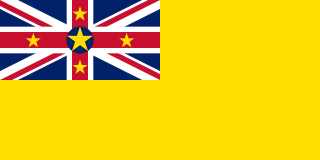
Niue is an island country in the South Pacific Ocean, 2,400 kilometres (1,500 mi) northeast of New Zealand. Niue's land area is about 261 square kilometres (101 sq mi) and its population, predominantly Polynesian, was about 1,600 in 2016. The island is commonly referred to as "The Rock", which comes from the traditional name "Rock of Polynesia". Niue is one of the world's largest coral islands. The terrain of the island has two noticeable levels. The higher level is made up of a limestone cliff running along the coast, with a plateau in the centre of the island reaching approximately 60 metres high above sea level. The lower level is a coastal terrace approximately 0.5 km wide and about 25–27 metres high, which slopes down and meets the sea in small cliffs. A coral reef surrounds the island, with the only major break in the reef being in the central western coast, close to the capital, Alofi.
The history of Niue is the history of the area and people of Niue, including its indigenous Polynesian societies. Niue was first settled by Polynesian sailors from Samoa in around 900 AD. Further settlers arrived from Tonga in the 16th century.

Politics of Niue takes place in a framework of a parliamentary representative democratic dependency, whereby the Chief Minister is the head of government, and of a non-partisan system. Niue is self-governing in free association with New Zealand and is fully responsible for internal affairs. New Zealand retains some responsibility for external affairs, in consultation with Niue. The Niue Constitution Act 1974 (NZ) vests executive authority in Her Majesty the Queen in Right of New Zealand and the Governor-General of New Zealand. The constitution specifies that in everyday practice, it is exercised by a Cabinet of the Premier of Niue and three other ministers. The premier and ministers must be members of the Niue Assembly, the nation's legislative assembly. The Judiciary is independent of the executive and the legislature.
Nonpartisan democracy is a system of representative government or organization such that universal and periodic elections take place without reference to political parties. Sometimes electioneering and even speaking about candidates may be discouraged, so as not to prejudice others' decisions or create a contentious atmosphere.
Niuean is a Polynesian language, belonging to the Malayo-Polynesian subgroup of the Austronesian languages. It is most closely related to Tongan and slightly more distantly to other Polynesian languages such as Māori, Sāmoan, and Hawaiian. Together, Tongan and Niuean form the Tongic subgroup of the Polynesian languages. Niuean also has a number of influences from Samoan and Eastern Polynesian languages.
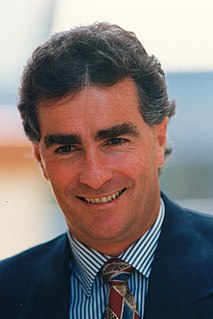
Mark Herbert Blumsky is a former New Zealand politician and diplomat. He was Mayor of Wellington from 1995 to 2001, and a Member of Parliament for the National Party from 2005 to 2008. Blumsky was New Zealand's High Commissioner to Niue from 2010 to 2014.
The music of Niue has a long history. Niue is a Polynesian island in the South Pacific. Though independent, it is in free association with New Zealand.
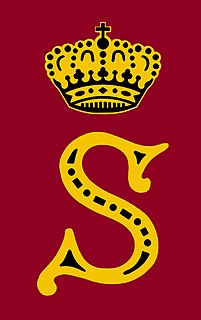
The Senate is one of the two chambers of the bicameral Federal Parliament of Belgium, the other being the House of Representatives. It is considered to be the "upper house" of the Federal Parliament. Created in 1831 as a chamber fully equal to the Chamber of Representatives, it has undergone several reforms in the past, most notably in 1993 and 2014. The 2014 elections were the first without a direct election of senators. Instead, the new Senate is composed of members of community and regional parliaments and co-opted members. It is a chamber of the communities and regions and serves as a platform for discussion and reflection about matters between these federated entities. The Senate today plays a minor role in the federal legislative process. However, the Senate, together with the Chamber, has full competence for the Constitution and legislation on the organization and functioning of the Federal State and the federated entities. Since the reform of 2014, it holds about ten plenary sessions a year.

The Niue Assembly is the legislature of Niue. It consists of 20 members; 14 representatives of the villages and 6 elected on a common roll. Members are directly elected by universal suffrage, and serve a three-year term. Niue follows the Westminster system of government, with the Premier elected by the Assembly and the Cabinet drawn from it.

Parliamentary elections were held in Niue on June 7, 2008. They were initially expected to be held in April, but were delayed until June 2008. Niue has a 20-member legislative assembly, called the Niue Assembly, whose members are elected by approximately 600 registered voters. The assembly consists of 20 total members, 6 elected on a common roll and 14 representatives of the villages
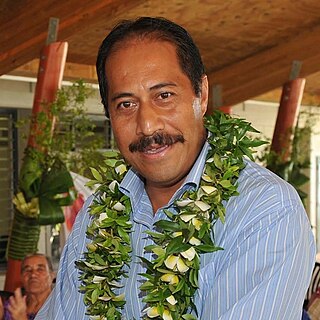
The Premier of Niue is Niue's head of government. They are elected by the Niue Assembly, and forms a Cabinet consisting of themselves and three other members of the Assembly.

The following outline is provided as an overview of and topical guide to Niue:

Tauveve O’Love Jacobsen is a Niuean politician and diplomat. She served as Niue's High Commissioner to New Zealand from 2011 to 2017. Her predecessor was Sisilia Talagi, Niue's first female diplomat and High Commissioner. She had previously served as a member of the Niue Assembly and a minister in Toke Talagi's government. She was previously a long-standing leading figure in the informal parliamentary Opposition to Young Vivian's government. She was, from 2008 to 2011, Minister of Health, Minister of Public Works, Minister of Women's Affairs, and Minister in charge of the Niue Power Corporation. She had previously been Minister of Education, Health, Environment, Training and Development. Additionally, Jacobsen is a member of the Commonwealth Parliamentary Association, and Patroness of the Niuean Volleyball Association.
Hima Ikimotu Douglas is a Niuean broadcaster, politician, and diplomat. He is Speaker of the Niue Assembly.

Women have been a vital part of history and culture in the geographic area known as Oceania today. Women in Oceania have diverse cultural identities which relate to the geography of the continent and the social structures of the people living there. Their evolution, culture and history coincide with the history of Oceania itself.
Joan Sisiati Tahafa Viliamu is a Niuean politician and former Cabinet minister.

Dalton Tagelagi is a Niuean politician and Premier of Niue since June 2020. He was elected premier by the Niue Assembly on 11 June 2020, defeating O'Love Jacobsen by 13 votes to 7.
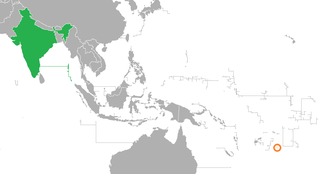
India–Niue relations refers to bilateral relations between India and Niue.

General elections were held in Niue for the first time on 23 March 1960. A total of 39 candidates contested the 14 seats in the Assembly, with 2,118 voters registered. Voter turnout was 97%.
Crossley Tatui is a Niuean politician and member of the Niue Assembly.










